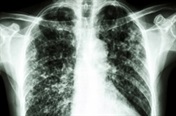
You should get tested for TB if you:
- Have spent time with someone with infectious TB
- Have HIV infection or another condition that puts you at high risk for TB disease
- Think you might have TB disease
- Are from a country where TB disease is very common i.e. Africa, Latin America, the Caribbean and Asia (excluding Japan)
- Inject drugs
- Live where TB disease is common (homeless shelters, hostels, prisons, some nursing homes)
Tuberculin skin test
A small amount of testing fluid, called tuberculin or PPD, is injected beneath the skin of your lower arm. Do not rub the injection site. (An immediate, local inflammatory type reaction may occur. Cold packs or topical glucocorticoid ointment may relieve discomfort. Allergic reactions have been reported. Rarely, swelling of lymph nodes may occur. If given to patients with TB, a severe reaction may occur.)
You are told within three days whether the test reaction was positive. A small lump at the injection site is a positive reaction and usually indicates TB infection. However, remember that infection with TB does not necessarily mean you have active, infectious TB. Most people with positive tuberculin tests do not have active TB.
People exposed to TB should be skin tested immediately. If you have recently become infected, your first skin test may show up negative. You may need a second test 10 to 12 weeks after the last time you were with the infectious person: it can take several weeks after infection for your immune system to react to the test. If your reaction to the second test is negative, you are probably not infected.
Because older people may have a poorer immune response, a two-step test method is used: if the test is negative, it is repeated in seven to ten days.
If you have a positive reaction, your doctor may perform other tests to check for TB disease, such as chest X-rays and sputum tests. As bacteria may be found elsewhere besides your lungs, blood or urine may also be tested. If your test is positive, close family members should also be tested.
Skin testing for TB is done during routine well-baby exams. Infants are usually screened at one year and children at five.
Reactivity to the test may be poor if you have advanced TB disease, viral infection (including immunisation with live viral vaccine during the previous 14 days), or bacterial infection. Patients receiving corticosteroids or other immunosuppressive agents, or who are suffering from malignant conditions, may also react poorly to the test.
On the other hand, people who have received the BCG vaccine (see later) may develop a positive reaction even if they have not been infected with TB bacteria. Generally speaking, the stronger the skin reaction, the more likely that you have been infected with TB, or you may even have active TB. However, you can see that interpreting a positive or a negative skin test can be difficult. The skin test therefore should ideally not be used as the only means of diagnosis of TB.
Chest X-ray
If you inhaled TB bacteria but fought off the infection, your lungs may be undamaged and your chest X-ray normal. If bacteria have attacked your lungs, your chest X-ray will be abnormal. Unfortunately, other conditions (lung cancer, for example) can also give people symptoms similar to those of TB, and also result in an abnormal chest X-Ray. Other tests are thus also often required to make a diagnosis of TB.
Sputum test
A sputum sample is examined under a microscope for TB bacteria. In some circumstances, the sputum may also be cultured to see if there are TB bacteria present. However, it may take up to six to eight weeks for a sputum culture to yield definite results. In an endemic area, TB can be diagnosed on the basis of a positive sputum smear alone. In fact, any patient with symptoms suggestive of TB who has a positive sputum smear should be started on anti-TB therapy, even if a culture is going to be done.
If a doctor suspects that the patient has extra-pulmonary TB (such as in the abdomen, urogenital system or brain) it is also possible to examine fluids from these sites under a microscope and to culture them for TB.
In some situations, neither the microscopic examination nor the culture will indicate the presence of any TB bacteria, and doctors may sometimes decide to treat for TB based on the patient's history of exposure to TB, symptoms, X-ray examination and any other evidence (e.g. skin test). You can see, though, that the diagnosis of TB is not always easy to make.
Newer tests
A lot of work is being done to find tests that are more reliable or quicker than the currently available tests. These new tests include:
Tests to detect the DNA of the TB bacterium in sputum samples. There are currently tests licensed for use in the diagnosis of TB. However, they are very expensive, and would not be practical for use in a high incidence population such as SA.
Immune based tests to see if the patient has antibodies, or some other immune response to TB that can be measured. A number of promising antibodies and methods have been investigated, but nothing is so far well enough established to be used as a routine diagnostic test.
Read more:
Reviewed by Dr AW Dreyer, Pathologist and Clinical Microbiologist, Centre for Tuberculosis, National Institute for Communicable Diseases February 2015.
Previously reviewed by Joanna Evans, PhD, Molecular Mycobacteriology Research Unit, Division of Medical Microbiology Institute of Infectious Diseases and Molecular Medicine, University of Cape Town, February 2011.




 Publications
Publications
 Partners
Partners
















